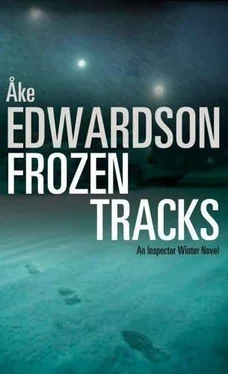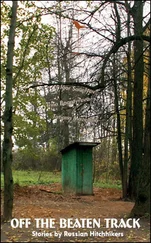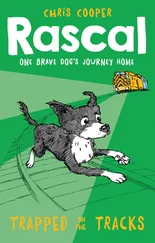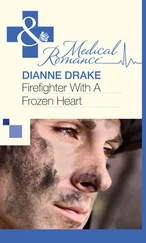“Are you pulling my leg?”
“Of course.”
***
But he wasn’t pulling anybody’s leg. Angela had seen that, and later, much later, he said so, after they made love and he got up to fetch two glasses of mineral water. He’d longed for a Corps, but didn’t have the strength to go out onto the balcony.
“You know that I have a sort of intuitive ability,” he’d said. “You know that.”
“What was it, then?”
“When Bertil and I drove home, we agreed that one of those elderly men, the older one, was lying through his teeth. You can tell. I mean, it’s our job to decide if people are telling the truth or lying.”
“Does it always matter?”
“What do you mean?”
“People lie for different reasons. I can see that myself. Some just come out with a lie, without knowing in advance that they’re going to lie. But it doesn’t change anything. It doesn’t turn them into criminals. It doesn’t necessarily mean that they are concealing something horrific.”
“No, but that was precisely the feeling I had out there. That there was something-something major that was being concealed. Something horrendous has happened. Do you understand? The old man we spoke to had something in his past that he didn’t want us to know about.” Winter took a drink of the mineral water. “But I also think the other one, Smedsberg’s father, was lying. I don’t know what to think. I don’t even know if it’s relevant.”
“He probably got nervous when two snobby chief inspectors from the big city showed up.”
“We’re not snobby.”
“Really? Were you wearing overalls?”
“Of course. Bought them in the village general store.”
He emptied his glass. He could see her profile.
“Do you think he had that boy Kaite shut up somewhere?”
“Hidden away? No.”
“What, then?”
“I don’t know, like I said. But I do know we need to talk to the other old man again, Carlström. Before that, though, I need to speak to Smedsberg.”
He noticed that she nodded slightly.
“At the same time we need to talk to these children, and have another word with their parents.”
“It’s awful,” she said.
“It could be even worse than we think,” he said.
She didn’t answer.
“I’ve tried to think this one through, looking for a possible pattern that might become clearer if we get some more facts, memories. Pictures. Objects. Things. If there is a pattern, it probably won’t make matters any easier. And if it gets more complicated it will also become… more horrendous.” He stretched out his hand, rubbed her shoulder that was firm but soft. “Can you see the way my thoughts are going?”
“That it will get worse,” she said.
“Yes.”
“That it could go on and on.”
“Yes.”
“But what can be done, though?” she asked. “Lock up the children? Have armed guards posted at day nurseries and children’s playgrounds, and schools?”
“It might be enough if there were more staff.”
“Ha!”
“But there’s no hundred percent certain way of stopping anybody who’s determined to hurt somebody.”
“So all you can do is wait?”
“Certainly not.”
“What would happen if the press announced that there was somebody out there. Waiting. Or preparing himself.”
“It wouldn’t be good,” he said.
“But what if you have to? What if you’re forced to inform the public?”
“There are various ways of doing that.”
“I’ve seen that little boy, Waggoner.” He could hear her breathing. “How is that possible? Eh? What makes a person do something like that?”
How is it possible to be rational and clear in reply to a question like that, he thought.
“I know there simply isn’t a rational and clear answer to that kind of question, but it has to be asked, don’t you think?” He could see that she was looking at him now. He could see a glint in her eye. “Don’t you think? Why? You have to ask why?”
“The answer to that question is what we’re always looking for,” he said.
“Is it enough?”
“Discovering why? I don’t know. Sometimes there is nothing.”
“No reason, you mean?”
“Yes. Why does somebody commit a serious crime? Is there only one reason? Is there a series of different reasons? Are they linked? Is it possible to analyze them logically? Should one even try to think logically if the crime, or crimes, are driven by chance and a lack of logic?” He looked at her again. “There could be so many possibilities. It could be pure lunacy, acute mental illness. Bad memories. Revenge.”
“Is that common? Revenge?”
“Yes. Revenge against somebody who has treated you badly. Directly or indirectly. Yes, it certainly is common. It can go a long way back.”
“A long way back in time?”
“A long way back,” said Winter again. “The past casts shadows. You know that. It happens so often. To find the answers now you have to pin down a
then. What happens now has its origins in that then.”
“So that could apply in this case as well? With the assaults on those students? As well as to the abuse of the boy?”
“Yes, certainly.”
“They are two different things, but still.”
“Hmm.”
“Aren’t they two different things?”
“Well…”
“You’re hesitating.”
“No, I’m thinking about this searching backward through time. Digging. Looking for answers.”
“You and your colleagues are acting like investigative journalists, you mean?”
“No. More like archaeologists. Archaeologists of crime.”
THE “WANTED” MESSAGE SENT OUT IN CONNECTION WITH ARYAN Kaite attracted a big response, but none of the tips led them to him, nor him to them.
“Anything new from the African clubs?” asked Fredrik Halders as they drove up through the hilly eastern suburbs to his house.
“No,” said Aneta Djanali. “He’s not a member. They knew who he was, of course, but he’s not on the membership rolls.”
“Are you a member?”
“Am I a member of what, exactly?”
“The Ougadougou Club.”
“What if I were to take you to Ougadougou, Fredrik? I sometimes think you dream about Ougadougou. You’re always talking about the place.”
“Isn’t everybody?” asked Halders.
Aneta Djanali was born in Eastern General Hospital in Gothenburg to African parents, immigrants from Burkino Faso, who had left their homeland when it was still called Upper Volta. Her father had trained in Sweden as an engineer, and they’d returned home when Aneta was about to become an adult. She had chosen to stay in Sweden. Of course. Her father now lived alone in a little house in the capital, and his house was the same bleached color as the sand surrounding the city. Everything there was hot, biting air (or blue frozen air), and people always cherished the same dreams about water that never came. Aneta had been back, if that was the right expression. It was a foreign country as far as she was concerned. She had immediately felt at home, but that was it-as if the expression “Home is where the heart is” had lost its meaning. She knew that she would never be able to live there: But, nevertheless, it would always be home.
She parked outside Halders’s house, where Advent candles were illuminating one of the windows.
“I can pick up Hannes and Magda, if you like,” she said, as he got out of the car.
“I thought you had a lot to do.”
“That can wait.” She gave a laugh. “I was going to get some tapioca root and dried bananas, but I’ve got enough to last me.”
“But what if your club throws a party tonight?”
“And what if people start taking your racist jokes seriously, Fredrik?”
Читать дальше












